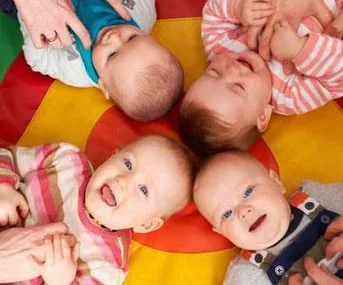Constant bickering between two siblings can be enough to drive even the most patient parents crazy — but no matter how much your kids argue, there is plenty you can do to help them get along.
Warren Cann, CEO of the Raising Children Network, and Michael Grose, author of Why First Born’s Rule the World, and Last Born’s Want to Change It share their tips for harmonious family living.
Use encouragement not praise
Focus on encouraging effort, rather than the final result. If one child achieves something, concentrate on the work they did to get there, not on the achievement itself. “That means parents can be giving that kind of encouragement to all of their kids,” Cann says.
Try to be fair. Kids are very sensitive to what they see as being treated unfairly so you should always aim towards fairness, or at least the illusion of it. “It’s not possible, really, for us to treat all our kids exactly the same in all situations, because all kids are different,” Cann says. “But it’s worth working towards fairness.”
Look for what is unique about each of your children and nurture that. “Parents can really help kids by looking out for that thing that can be nurtured,” Cann says. “That interest, that ability — encourage it!”
Foster a sense of family togetherness. Parents should insist that their kids take an interest in each other and be supportive of their sibling’s activities and achievements. “You should encourage the idea that ‘we look out for each other’,” says Grose.
Avoid comparisons
Avoid making comparisons between kids as it can fuel anger and resentment. Don’t say things like, “He’s the academic one”, or “She’s the sporty one”.
Be conscious about who you’re talking about, and how often you’re talking about them.
Help kids to compare themselves to themselves, not other people.
Sport can be a great way to teach kids these lessons. It teaches kids not to compare themselves to others and instead focus on being the best they can be.
“You can always find someone who’s better than you at something,” Cann says. “In sport, there is only one person who can win the gold medal in the whole world, and does that mean that every other competitor has to be unhappy?
“What you often see, is that sports people are focused on getting their personal best.”
Don’t make anyone feel guilty
Don’t make a child feel bad if they are jealous.
“Jealousy tends to come from a sense of insecurity or feeling threatened, so if a child expresses jealousy, you don’t want to make them feel bad about it by saying they shouldn’t feel like that,” Carr says.
“It’s understandable- feelings of jealousy can be normal, it doesn’t mean you are a bad person.”
Share your time around evenly
Be aware of the ‘parenting time budget’. If parents find themselves spending a lot of time on one child, ferrying them around to coaching etc., think about you can make it up to your other kids.
Play dates or one-on-one time can be a nice way of re-addressing imbalances in the time we are spending.
Ultimately you won’t be able to control exactly how your children feel about each other, but if you raise them to prize effort over achievement, you’re more likely to raise a harmonious family.



